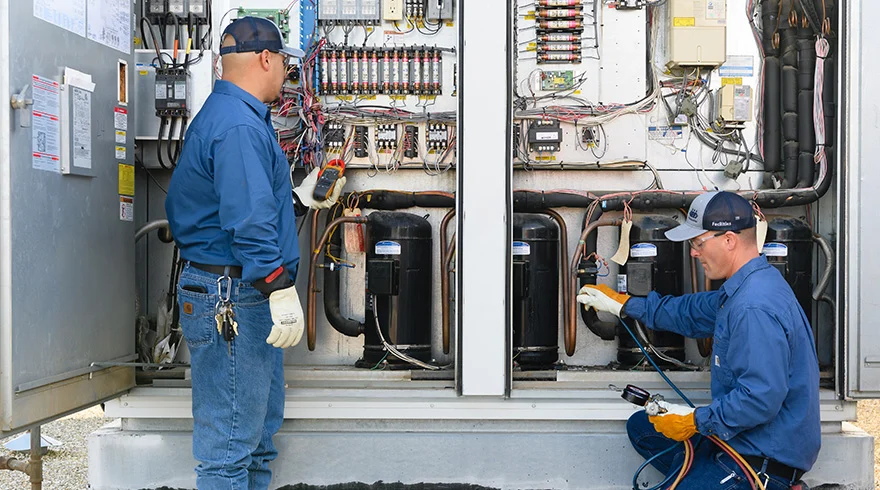Refrigerants are at the core of heating, ventilation, and air conditioning systems, but they also come with environmental and legal responsibilities. Over the years, regulations have undergone significant shifts, phasing out harmful substances and introducing stricter compliance requirements for contractors. These rules are designed to reduce greenhouse gas emissions and protect the atmosphere from damage caused by older refrigerants. For homeowners and businesses, understanding how HVAC contractors navigate these regulations helps build confidence in the safety and sustainability of their heating, ventilation, and air conditioning (HVAC) systems. Proper management of refrigerants is crucial to ensure efficiency while maintaining compliance with national and international standards.
Adapting to evolving refrigerant rules
One of the primary challenges contractors face is staying up-to-date with the constantly evolving refrigerant regulations. Rules have changed over time, particularly regarding substances like R-22, which was widely used but later phased out due to its impact on the ozone layer. Contractors must keep track of deadlines, allowable refrigerants, and proper handling methods to ensure compliance with regulations. Training is an ongoing process, as new refrigerants and technologies enter the market. Technicians must understand the properties of each refrigerant and how to handle them safely to prevent environmental harm and system damage. Regulatory agencies also require contractors to keep thorough records of refrigerant purchases, recovery, and disposal, which adds to their responsibilities. For larger companies, including those managing an office in Summerlin, Las Vegas, compliance strategies often include investing in advanced tools and providing continuous training to ensure staff remain aligned with updated requirements. This adaptability ensures that customers receive systems designed for longevity and compliance.
Proper refrigerant handling and recovery
Another crucial aspect of managing refrigerant compliance is ensuring that handling and recovery are performed in accordance with established standards. Contractors are responsible for preventing the release of refrigerants into the atmosphere, which requires specialized equipment for recovery and recycling. Every step, from charging systems with refrigerant to reclaiming it during repairs, must be done carefully to prevent leaks or contamination. Regulations require contractors to use certified recovery machines and approved storage containers to handle refrigerants safely. Additionally, technicians are often required to complete certification programs that verify their understanding of the risks and methods involved in refrigerant management. These practices not only protect the environment but also preserve the efficiency of HVAC systems by ensuring refrigerants are clean and adequately charged. Failure to comply with these requirements can result in fines and penalties, which is why contractors treat refrigerant handling as a core aspect of their service responsibilities.
Record keeping and accountability
Record-keeping plays a central role in complying with refrigerant regulations. Contractors are often required to document the type and quantity of refrigerants they purchase, store, and use. They must also maintain detailed logs of recovery and disposal activities to ensure transparency and accountability throughout the process. These records are critical during inspections or audits by regulatory authorities, as they demonstrate that proper procedures are being followed. In some cases, larger systems may even require leak detection programs with documented results to comply with stricter standards. For contractors, maintaining accurate records not only protects them from potential legal issues but also reinforces trust with clients who want assurance that their systems are managed responsibly. Accountability extends to educating customers about refrigerant choices and compliance obligations, ensuring that property owners also understand the importance of responsible refrigerant use.
Transitioning to sustainable alternatives
As environmental concerns grow, the transition to sustainable refrigerants has become a priority for HVAC contractors. Modern systems are being designed to utilize alternatives with lower global warming potential, thereby helping to reduce environmental impact while maintaining performance. Contractors play a key role in advising clients on which systems and refrigerants meet current standards and are likely to remain compliant in the future. This requires a balance of technical knowledge, environmental awareness, and an understanding of upcoming regulatory changes. Transitioning often involves retrofitting existing systems or recommending complete replacements when older refrigerants are no longer viable. Contractors ensure that these changes are carried out smoothly, minimizing disruption while aligning with legal requirements. The move toward sustainable refrigerants highlights the ongoing role of HVAC contractors as both service providers and environmental stewards.
Read More: https://acubi.us/hvac-system/
Protecting clients and the environment
Ultimately, refrigerant compliance is about more than following regulations—it is about protecting both clients and the environment. Proper management prevents harmful emissions, reduces waste, and ensures systems operate efficiently without causing unnecessary strain on resources. For clients, this means fewer breakdowns, improved energy efficiency, and peace of mind knowing their HVAC systems are compliant with the latest regulations. For contractors, it builds credibility and long-term trust, as customers see the value in environmentally responsible service. This responsibility extends beyond immediate projects, as contractors must continually update their practices to reflect new standards and technologies. In doing so, they provide a service that benefits both individual property owners and the broader community. Compliance becomes a foundation for sustainable practices that support long-term comfort and environmental protection.
Managing refrigerant regulations is one of the most critical responsibilities HVAC contractors face. From adapting to evolving rules and ensuring proper handling to maintaining detailed records and guiding clients toward sustainable alternatives, contractors must strike a balance between compliance and quality service. Their work directly impacts the safety of homes and businesses while contributing to environmental protection. For clients, hiring a contractor who understands refrigerant compliance means greater efficiency, fewer risks, and long-term confidence in their HVAC systems. As regulations continue to evolve, the role of contractors will remain essential in ensuring that refrigerant use aligns with both legal and environmental goals, creating a future that is both comfortable and sustainable.



